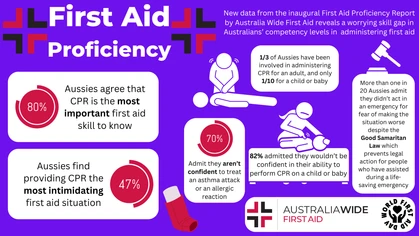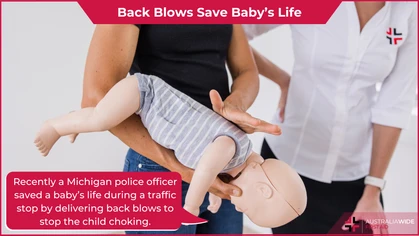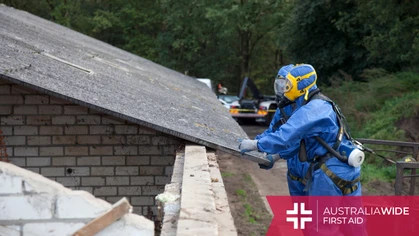No, Siri Cannot Give You CPR Instructions

First aid in the news
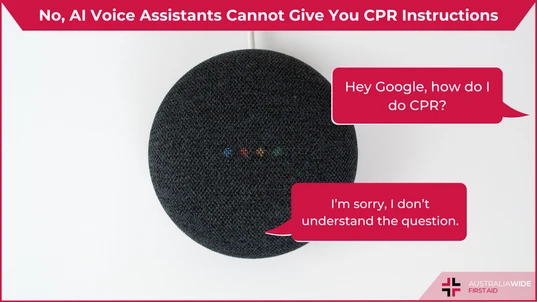 The use of AI is growing ever more expansive. It’s in our smart phones, our computers, and our voice assistants. About 42% of Australians use a voice assistant such as Siri, Google Assistant, or Amazon Alexa. These assistants, however, don’t seem to be useful in a crisis.
The use of AI is growing ever more expansive. It’s in our smart phones, our computers, and our voice assistants. About 42% of Australians use a voice assistant such as Siri, Google Assistant, or Amazon Alexa. These assistants, however, don’t seem to be useful in a crisis.
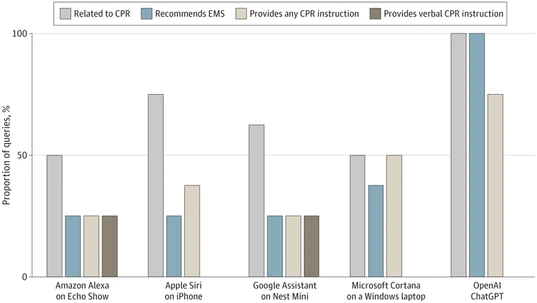
Responses to 8 cardiopulmonary resuscitation (CPR) questions are presented by product. EMS indicates emergency medical services.
The Study
A recent study explored the use of AI voice assistants to give advice during a medical emergency requiring CPR. The idea behind this stems from two areas. The first is that almost half of all out-of-hospital cardiac arrest incidences have CPR performed by a layperson. This is despite the widespread availability of CPR courses like ours. The second factor is the pervasive use of voice assistants throughout society. People use their Siri, Home, or Alexa for everything from finding out the weather to adding items to online shopping carts. It is not unreasonable to expect a person facing an emergency to ask an AI voice assistant for what to do. The researchers noted that responders to an emergency could acquire verbal instructions for CPR from emergency dispatchers, but that these services are not universally available. They may also be limited by language, audio quality, disconnection, fear of law enforcement, and perceived costs. The results of the study were very underwhelming. Almost half of all queries were answered with unrelated information. Only 28% of the responses suggested calling emergency services. This means in an emergency, asking an AI voice assistant would prove to be a very costly waste of time. Delaying medical attention can be fatal, as could spending time trying to get a useful answer out of an AI voice assistant. The study suggests that responders to an emergency should prioritise calling emergency services, rather than trying to get an AI voice assistant to help.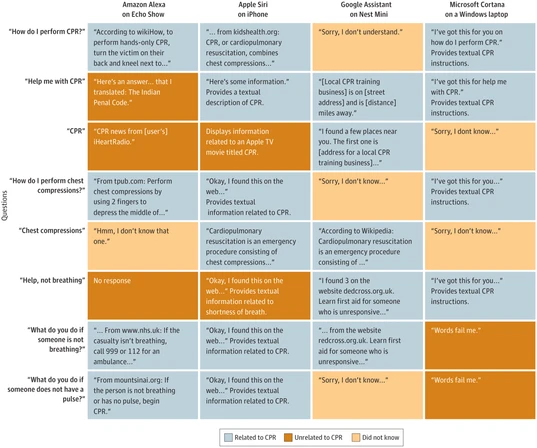
Responses to cardiopulmonary resuscitation (CPR) questions by artificial intelligence voice assistants are presented, colored according to whether the response was determined to be related to CPR (providing information pertaining to CPR or recommending the use of emergency services) or unrelated to CPR or if the VA acknowledged that it did not know the answer. Responses shown here are abbreviated versions of full response transcriptions.
How Could AI Voice Assistants Be Useful?
Here lies the future potential of AI voice assistants. With such technology available in almost half of Australian households, it is feasible that they could become a source of information in a crisis. The researchers have suggested the following for voice assistant technology, which we have expanded upon:- Building CPR instructions into core functionality:
- Integrate CPR instructions as a core feature of devices and systems.
- Ensure that users can easily access CPR guidance when needed.
- Designating common phrases to activate CPR instructions:
- Choose user-friendly phrases or keywords that can trigger CPR instructions.
- Implement voice recognition or simple input methods for activation.
- Establishing a single set of evidence-based content items across devices:
- Standardize the CPR instructions content to ensure consistency.
- Base the content on the latest evidence-based guidelines for CPR.
- Including prioritizing calling emergency services for suspected cardiac arrest:
- Emphasize the importance of calling Triple 0 or emergency services immediately in case of suspected cardiac arrest.
- Integrate automated features that can dial emergency services directly.
First Aid Training is Irreplaceable
The study truly highlights how irreplaceable first aid training is. Knowing that you have the knowledge and skills to respond in an emergency is priceless. Since you cannot rely upon the technology in your house, you must rely upon yourself. Keeping your training up to date is the best way to help save a life should a tragedy occur. Use our Find a Course Near Me function at the top of this page, and upskill yourself with this incredibly important knowledge today!Further Resources
The study discussed can be found here: Quality of Layperson CPR Instructions From Artificial Intelligence Voice Assistants William Murk, MD, PhD, MPH, MS1; Eric Goralnick, MD, MS2,3; John S. Brownstein, PhD3,4; et al
Originally published at
https://www.australiawidefirstaid.com.au/resources/no-siri-cant-give-you-cpr-instructions
as part of the Australia Wide First Aid Articles Library
